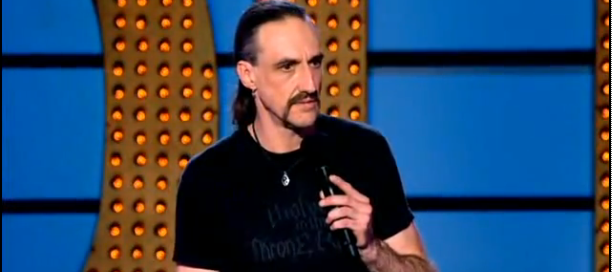Okay, so winter may not arrive officially until the 21st of next month however unofficially, in my mind it’s moved in already and taken over like an occupying force. I reckon we can all admit to having enjoyed a long warm summer this year and that’s an increasingly rare thing to say but don’t those glorious days of sandals and sun lotion seem an age ago already? And what’s replaced them? Wind, rain, chills and that annual pain-in-the-neck, the common cold. Yes, you’ve guessed it – I’ve got a stinker already!
For the last two days I’ve been shuffling around like a think-headed, red-eyed zombie, my joints aching and my nose itching and streaming so much that I wonder just where the hell all that fluid comes from. It may not be quite debilitating but it certainly makes you feel miserable.
So, last night as a counter-measure, I prescribed for myself a good dose of humour. A hearty laugh is always a sure-fire tonic and the sort of dose I was thinking of administering would be found in something like a Carry-On film or one of those slightly daft yet rib-tickling comedies from the ’50s or ’60s, starring a role-call of familiar faces from British cinema in its heyday.
I settled on a film that was completely unfamiliar to me – The Fast Lady from 1962. It tells the story of enthusiastic cyclist Murdoch Troon (played by Stanley Baxter) who one day is run off the road by impatient Charles Chingford (James Robertson Justice) in his Rolls Royce. Troon tracks the man down to his beautiful home with its manicured lawns and demands compensation for his damaged bicycle. It is here that he meets Chingford’s beautiful daughter Claire (Julie Christie) and the two are instantly attracted to one another. Learning that she is a lover of sports cars as well as “the men who drive them”, Troon decides to buy a car and pass his driving test.
Fortunately for Troon, his friend and fellow lodger is Freddie Fox (Leslie Phillips), an under-performing used car salesman with a keen (make that VERY KEEN) eye for the ladies. On discovering that Charles Chingford is the owner of a local sports car dealership, Fox sees the possibility of getting in with Chingford as well as selling Troon a car. And the car in question is a 1927 vintage Bentley named The Fast Lady.
What follows is all perfectly charming and uncomplicated fun as Troon, determined to be the man he thinks Claire wants him to be, takes his first driving lesson and then later, his test. He also has to deal with Claire’s bad-tempered father and the man’s extreme dislike of him and the two go on to make a wager that, should Troon lose, means he must never see Claire again. Meanwhile, Freddie Fox schemes, Claire Chingford coos, her father blusters and Troon, a rather clumsy Scot, soldiers on seemingly oblivious to the disaster he leaves in his wake. All very amusing.
The film was directed by Ken Annakin, a man of great talent and diversity. Not only did he give us such Disney classics as The Story of Robin Hood and His Merrie Men and Swiss Family Robinson, he also directed big scale war movies like The Longest Day (the British segments) and Battle of the Bulge as well as riotous comedies like Those Magnificent Men in their Flying Machines and Monte Carlo or Bust!
Perhaps best known for his hilarious television shows which first appeared in the ’60s, Stanley Baxter – a Scotsman himself – plays Murdoch Troon with a believable measure of innocent heroism. He’s not as naive or hapless as, say, Norman Wisdom in his slapstick comedies, but he’s not a million miles away either. He’s a likeable chap though and you root for his character from the off.
Leslie Phillips is perfect doing what he does best and there’s only one other actor I can think of who nailed the cad as well – albeit to a more rotten degree – and that was Terry Thomas. Julie Christie, in only her second film role, seems quite at home in her part. Annakin captures her extraordinary beauty in several well-framed close-ups and it’s no wonder that she would soon become a global star. Three years later, when she starred as Lara Antipova in Dr Zhivago, Life magazine hailed 1965 as “The Year of Julie Christie” such was her impact on the silver screen. James Robertson Justice as her father, is excellent as always, and his domineering and acerbic Charles Chingford is similar to his Sir Lancelot Spratt in the Dirk Bogarde “Doctor” movies.
Along the way, the familiar faces of numerous comedy and character actors from the era pop up in cameos, among them Frankie Howerd, Dick Emery and Bernard Cribbins. I loved seeing how the roads and the high streets have changed over the years (the film was shot in and around Beaconsfield apparently) and also enjoyed car-spotting all those models that are now only seen at classic car rallies. The Fast Lady enjoyed great success at the British box office upon its release and fifty years later, it still has the ability to take your mind off your worries.


